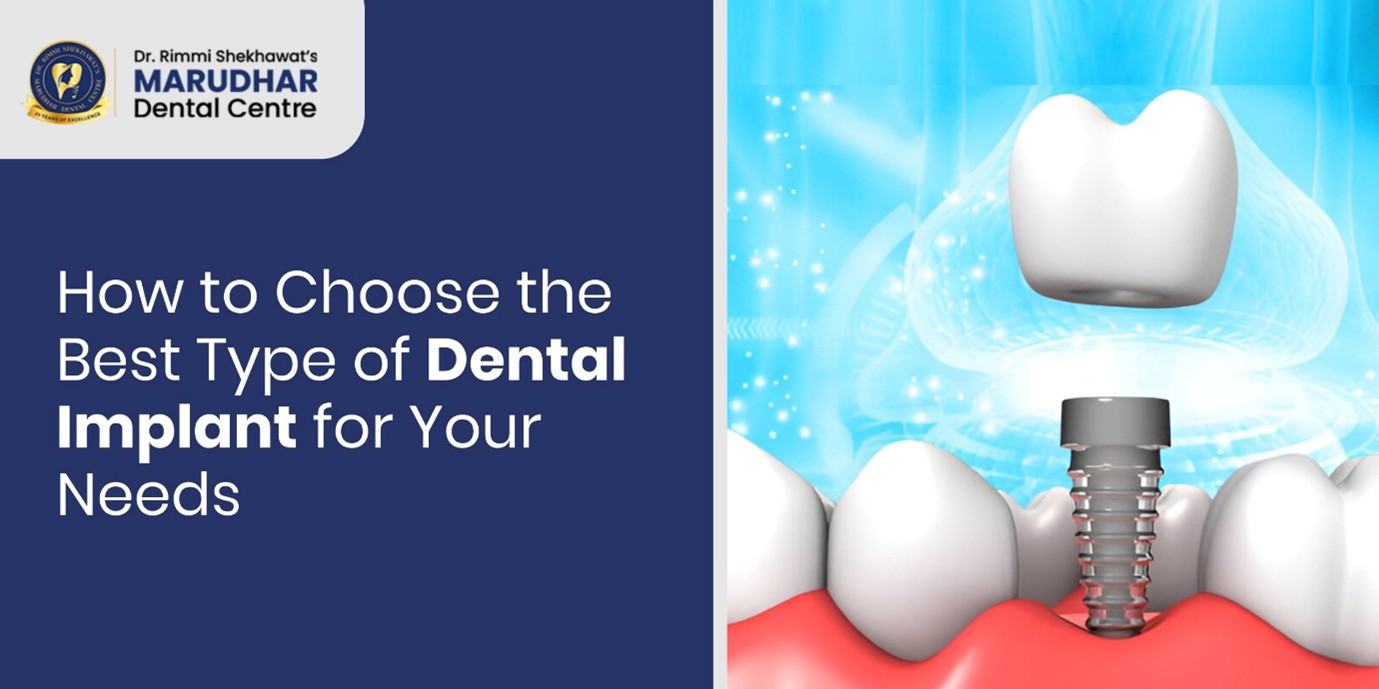Good smile is a significant factor in our appearance and mood. It may be difficult to eat, talk or even smiling with missing teeth. Dental implants are a new and durable solution of replacing missing teeth. They are also natural in appearance and feel like teeth and can be used to enhance both comfort and confidence. Dr. Rimmi Shekhawat is an expert dentist in Jaipur and provides a personalized dental implant therapy which is aimed at addressing the specific patient needs. The selection of the appropriate dental implant will determine the difference between comfort, longevity, and appearance. The guide will assist in knowing what dental implants are and the various types that are available in the market and how to choose the best one to ensure it supports your dental health.
What Are Dental Implants?
Dental implants are titanium or ceramic posts that are small and have taken the place of the root of a lost tooth. Once they are fitted in the jawbone, they serve as powerful pillars to artificial teeth like crowns, braces, or dentures.
They are made to resemble the structure and functionality of natural teeth, thus enabling one to chew, smile, and talk easily. Dental implants are permanent and provide stability unlike the removable dentures, which make them feel natural.
The difference between dental implants, and the rest of the tooth replacements:
- Dental Bridges: Bridges are attached to the teeth that surround it and thus, the teeth that surround it become weak in the long run.
- Dentures: This is removable and can slip or result in discomfort during eating or talking.
- Implants: They are durable, firm and seam with your natural teeth.
The selection of the correct implant is not only the replacement of a lost tooth, but also regarding your teeth and self-esteem. You can find the safest and the most efficient solution depending on your needs only with the help of a best dentist in Jaipur, such as Dr. Rimmi Shekhawat.
Factors to Consider Before Choosing a Dental Implant
Your dentist will evaluate a number of factors before settling on the kind of dental implant to use in a bid to achieve optimal outcomes.
These are a few major points that should be taken into account:
- Bone Density and Jaw Structure: Dental implants require a robust jawbone to be held in place. In case of a low bone density, then your dentist may recommend bone grafting prior to installing the implant.
- Oral Health Condition: There must be healthy gums and teeth in the implant area. All gum disease or untreated caries must be treated prior to the placement of implants.
- Overall Health: Some medical ailments such as diabetes or smoking will influence healing. Your dental health history is another topic to talk about in order to get your dentist to plot the best course of action.
- Number of Missing Teeth: The type of implant to use will also depend on whether you are missing a single tooth or several as well as all your teeth.
- Budget and Lifestyle: Depending on the type of implant, the cost, and time it takes to treat them, may also differ. Your dentist is going to guide you to a solution which will be more fitting to your needs and lifestyle.
Types of Dental Implants
Dental implants come in various types and each of them is aimed at a particular condition. Knowing them makes you select the most appropriate one depending on your bone structure and the mouth.
1. Endosteal Implants
Description:
The most prevalent form of dental implant is the endosteal implants. They are directly inserted in the jawbone and made of titanium.
Ideal For:
Patients possessing a strong and healthy jawbone
Benefits:
Offers great stability.
Feels like a natural tooth.
Long-lasting and durable.
These artificial roots are known to be crowns or bridges, attached to them.
2. Subperiosteal Implants
Description:
They are implants placed under the gum and placed on top of the jawbone rather than on top of it.
Ideal For:
Patients with a lack of healthy bone, and unable to get a bone graft.
Benefits:
Less invasive than endosteal implants.
Fitted on thin jawbones.
The implants that can be used in the case of a subperiosteal are areas where the normal jawbone cannot support a regular implant, however, the patient desires a fixed replacement.
3. Zygomatic Implants
Description:
The longer zygomatic implants are provided and are held by the cheekbone (zygomatic bone) instead of the jawbone.
Ideal For:
Patients with severe upper jaw bone loss.
Benefits:
No need for bone grafting.
Appropriate on the complicated cases where common implants are inapplicable
Such implants are specialized and only qualified personnel such as Dr. Rimmi Shekhawat who has the expertise and the training in performing such sophisticated kind of work should carry out this implant.
How to Decide Which Implant Is Right for You
The types of implants used are based on a number of factors of the individual and health. Professional consultation assists in a wise choice.
Here are the key steps:
Have a Complete Dental Examination:
To assess bone strength and condition of gums, your dentist will perform X-rays or 3D scans.
In this individualized treatment plan, the practitioner will engage the patient in a social relationship devoid of commercial relationships and conflict.
Every mouth is different. Dr. Rimmi Shekhawat is an expert who will design a plan that will suit your needs with comfort, stability and the long-term results.
Discuss All Options:
Discuss the advantages and disadvantages of each type of implant. The knowledge of recovery time, costs, and care needs is what will make your right decision.
Ask the Right Questions:
Ask your dentist before you decide:
- What type of implants would be best to my bone condition?
- How can the recovery be prolonged?
- What are the aftercare steps to be used?
- What is the success rate of this treatment?
The better off you are informed the better off you will be about your choice of treatment.
Recovery and Care Tips
Once having an implantation done on the teeth, it is important to take proper care to achieve successful recovery, and make it last.
The following are things to expect and do after surgery:
Mild Discomfort:
A certain degree of swelling or soreness is normal within the few days. Dentist can prescribe some pain medication.
Keep in mind to adhere to the post-surgery instructions. The first few days should be avoided with hard and hot foods. Keep to soft food until the locality is healed.
Good Oral Hygiene:
Lightly brush around the area of implants and run into an antibacterial mouthwash. Infection can be avoided by keeping the mouth clean.
Avoid Smoking and Alcohol:
These retard healing and can impact on the success of the implant.
Regular Dental Checkups:
See your dentist once in 6 months to checkup and have him clean your teeth. This will make the implant always stay in good condition.
Healthy Lifestyle:
Consume healthy food that contains a lot of calcium and vitamins to fight bones.
With such care tips, your dental implant will last your lifetime.
Why Choosing the Right Dentist Matters
Long-term outcome on dental implants needs skill and experience. With a qualified and experienced dentist, the procedure will be safe, comfortable and successful. Dr. Rimmi Shekhawat is the specialist who is characterized by a patient-centered attitude and attention to detail. She takes time to learn the needs of each patient and applies the advanced methods to be able to obtain a perfect smile.
Her clinic offers:
- High-tech 3D imaging of precise placement of implants.
- Individualized therapy to patients.
- Premise to comfort and oral health in the long-term perspective.
Conclusion
Dental implants are not just a replacement of teeth but it is an investment in your mouth and your self-esteem. The selection of the apposite kind of implant would guarantee comfort, strength and a natural appearance that is durable and lasts long. Regardless of whether you require one implant or a full-mouth restoration, a visit to an expert like Dr. Rimmi Shekhawat will guide you towards the best choice to make with regards to your smile.
In short:
- Understand your options.
- The first thing to do is to select the implant that matches your bone and oral health.
- Take care and maintenance as recommended by your dentist.
The right choice is the first step towards having a confident healthy smile.
Call now and book a consultation with Dr. Rimmi Shekhawat and receive the ideal dental implant solution that is tailored to you.






